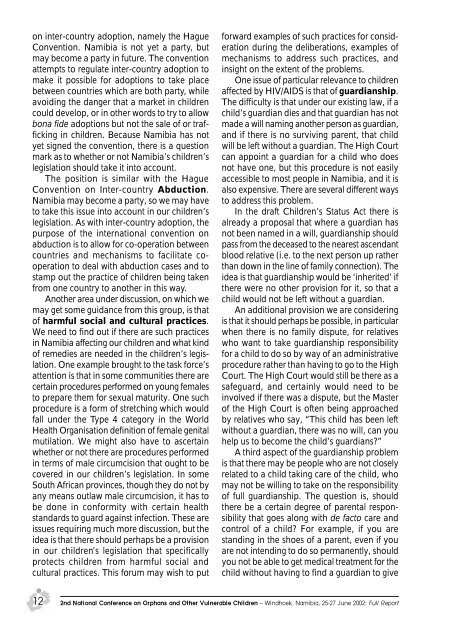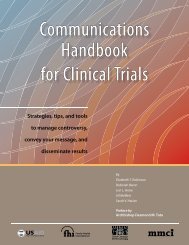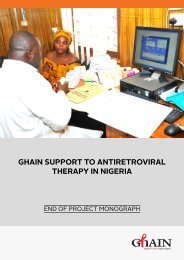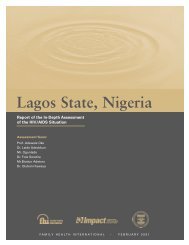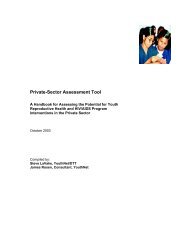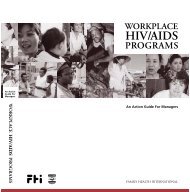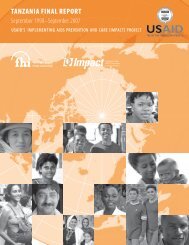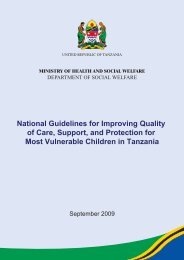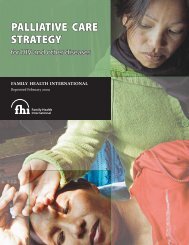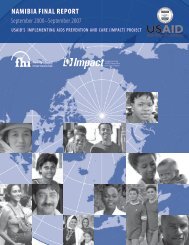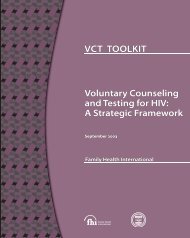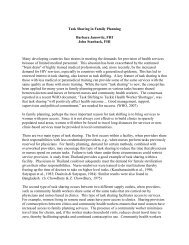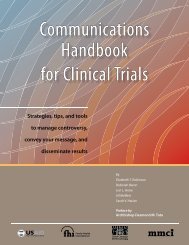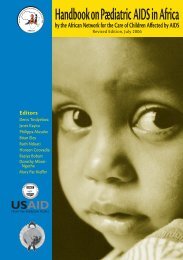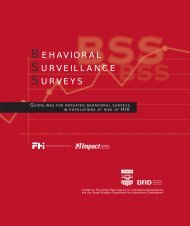2nd National Conference on Orphans and Other ... - FHI 360
2nd National Conference on Orphans and Other ... - FHI 360
2nd National Conference on Orphans and Other ... - FHI 360
Create successful ePaper yourself
Turn your PDF publications into a flip-book with our unique Google optimized e-Paper software.
<strong>on</strong> inter-country adopti<strong>on</strong>, namely the Hague<br />
C<strong>on</strong>venti<strong>on</strong>. Namibia is not yet a party, but<br />
may become a party in future. The c<strong>on</strong>venti<strong>on</strong><br />
attempts to regulate inter-country adopti<strong>on</strong> to<br />
make it possible for adopti<strong>on</strong>s to take place<br />
between countries which are both party, while<br />
avoiding the danger that a market in children<br />
could develop, or in other words to try to allow<br />
b<strong>on</strong>a fide adopti<strong>on</strong>s but not the sale of or trafficking<br />
in children. Because Namibia has not<br />
yet signed the c<strong>on</strong>venti<strong>on</strong>, there is a questi<strong>on</strong><br />
mark as to whether or not Namibia’s children’s<br />
legislati<strong>on</strong> should take it into account.<br />
The positi<strong>on</strong> is similar with the Hague<br />
C<strong>on</strong>venti<strong>on</strong> <strong>on</strong> Inter-country Abducti<strong>on</strong>.<br />
Namibia may become a party, so we may have<br />
to take this issue into account in our children’s<br />
legislati<strong>on</strong>. As with inter-country adopti<strong>on</strong>, the<br />
purpose of the internati<strong>on</strong>al c<strong>on</strong>venti<strong>on</strong> <strong>on</strong><br />
abducti<strong>on</strong> is to allow for co-operati<strong>on</strong> between<br />
countries <strong>and</strong> mechanisms to facilitate cooperati<strong>on</strong><br />
to deal with abducti<strong>on</strong> cases <strong>and</strong> to<br />
stamp out the practice of children being taken<br />
from <strong>on</strong>e country to another in this way.<br />
Another area under discussi<strong>on</strong>, <strong>on</strong> which we<br />
may get some guidance from this group, is that<br />
of harmful social <strong>and</strong> cultural practices.<br />
We need to find out if there are such practices<br />
in Namibia affecting our children <strong>and</strong> what kind<br />
of remedies are needed in the children’s legislati<strong>on</strong>.<br />
One example brought to the task force’s<br />
attenti<strong>on</strong> is that in some communities there are<br />
certain procedures performed <strong>on</strong> young females<br />
to prepare them for sexual maturity. One such<br />
procedure is a form of stretching which would<br />
fall under the Type 4 category in the World<br />
Health Organisati<strong>on</strong> definiti<strong>on</strong> of female genital<br />
mutilati<strong>on</strong>. We might also have to ascertain<br />
whether or not there are procedures performed<br />
in terms of male circumcisi<strong>on</strong> that ought to be<br />
covered in our children’s legislati<strong>on</strong>. In some<br />
South African provinces, though they do not by<br />
any means outlaw male circumcisi<strong>on</strong>, it has to<br />
be d<strong>on</strong>e in c<strong>on</strong>formity with certain health<br />
st<strong>and</strong>ards to guard against infecti<strong>on</strong>. These are<br />
issues requiring much more discussi<strong>on</strong>, but the<br />
idea is that there should perhaps be a provisi<strong>on</strong><br />
in our children’s legislati<strong>on</strong> that specifically<br />
protects children from harmful social <strong>and</strong><br />
cultural practices. This forum may wish to put<br />
forward examples of such practices for c<strong>on</strong>siderati<strong>on</strong><br />
during the deliberati<strong>on</strong>s, examples of<br />
mechanisms to address such practices, <strong>and</strong><br />
insight <strong>on</strong> the extent of the problems.<br />
One issue of particular relevance to children<br />
affected by HIV/AIDS is that of guardianship.<br />
The difficulty is that under our existing law, if a<br />
child’s guardian dies <strong>and</strong> that guardian has not<br />
made a will naming another pers<strong>on</strong> as guardian,<br />
<strong>and</strong> if there is no surviving parent, that child<br />
will be left without a guardian. The High Court<br />
can appoint a guardian for a child who does<br />
not have <strong>on</strong>e, but this procedure is not easily<br />
accessible to most people in Namibia, <strong>and</strong> it is<br />
also expensive. There are several different ways<br />
to address this problem.<br />
In the draft Children’s Status Act there is<br />
already a proposal that where a guardian has<br />
not been named in a will, guardianship should<br />
pass from the deceased to the nearest ascendant<br />
blood relative (i.e. to the next pers<strong>on</strong> up rather<br />
than down in the line of family c<strong>on</strong>necti<strong>on</strong>). The<br />
idea is that guardianship would be ‘inherited’ if<br />
there were no other provisi<strong>on</strong> for it, so that a<br />
child would not be left without a guardian.<br />
An additi<strong>on</strong>al provisi<strong>on</strong> we are c<strong>on</strong>sidering<br />
is that it should perhaps be possible, in particular<br />
when there is no family dispute, for relatives<br />
who want to take guardianship resp<strong>on</strong>sibility<br />
for a child to do so by way of an administrative<br />
procedure rather than having to go to the High<br />
Court. The High Court would still be there as a<br />
safeguard, <strong>and</strong> certainly would need to be<br />
involved if there was a dispute, but the Master<br />
of the High Court is often being approached<br />
by relatives who say, “This child has been left<br />
without a guardian, there was no will, can you<br />
help us to become the child’s guardians?”<br />
A third aspect of the guardianship problem<br />
is that there may be people who are not closely<br />
related to a child taking care of the child, who<br />
may not be willing to take <strong>on</strong> the resp<strong>on</strong>sibility<br />
of full guardianship. The questi<strong>on</strong> is, should<br />
there be a certain degree of parental resp<strong>on</strong>sibility<br />
that goes al<strong>on</strong>g with de facto care <strong>and</strong><br />
c<strong>on</strong>trol of a child? For example, if you are<br />
st<strong>and</strong>ing in the shoes of a parent, even if you<br />
are not intending to do so permanently, should<br />
you not be able to get medical treatment for the<br />
child without having to find a guardian to give<br />
12 <str<strong>on</strong>g>2nd</str<strong>on</strong>g> <str<strong>on</strong>g>Nati<strong>on</strong>al</str<strong>on</strong>g> <str<strong>on</strong>g>C<strong>on</strong>ference</str<strong>on</strong>g> <strong>on</strong> <strong>Orphans</strong> <strong>and</strong> <strong>Other</strong> Vulnerable Children – Windhoek, Namibia, 25-27 June 2002: Full Report


